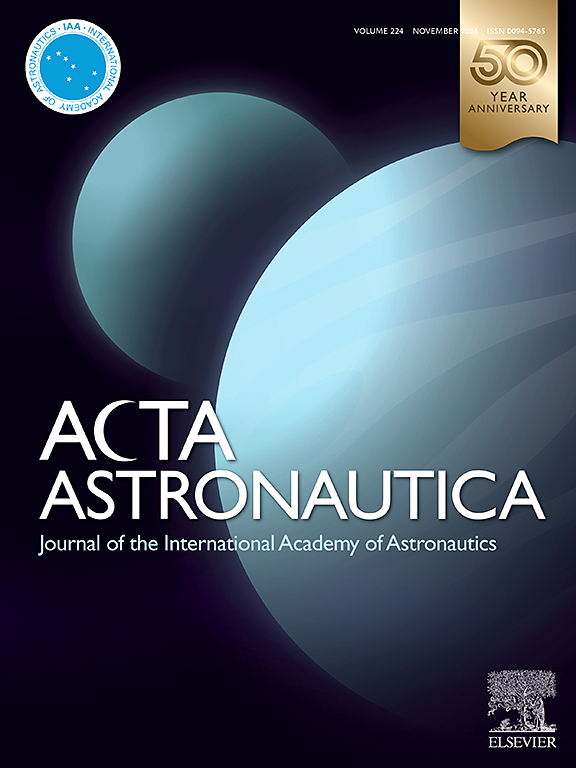Learning-based control for deployment and retrieval of a spinning tethered satellite formation system
IF 3.1
2区 物理与天体物理
Q1 ENGINEERING, AEROSPACE
引用次数: 0
Abstract
This paper investigates the nonlinear dynamics and control of the deployment and retrieval for a spinning tethered satellite formation system via artificial intelligent method. A dynamic model of the spinning tethered formation system is developed to describe the attitude motions of the system, involving the relative rotations of the tethers to the central main satellite. Considering the system with symmetric and asymmetric configurations, a learning-based control strategy with low time cost is proposed to achieve the stable deployment and retrieval of tethers. In the strategy, a nonlinear model predictive control law accounting for the control constraints and nonlinear dynamics is developed to achieve the control goal. Based on a deep learning method, a dataset including control input and state output obtained offline is trained to form deep neural networks. An online feedback control of the system can be achieved by conducting real-time mapping from the system state to the control input using the neural networks. Finally, numerical simulations for deployment and retrieval of the system with different configurations are presented to demonstrate the computational efficiency and to validate the effectiveness of the control strategy.
基于学习的控制,用于部署和回收旋转系留卫星编队系统
本文通过人工智能方法研究了旋转系留卫星编队系统部署和回收的非线性动力学和控制。建立了旋转系留编队系统的动态模型来描述系统的姿态运动,包括系留卫星与中央主卫星的相对旋转。考虑到系统的对称和非对称配置,提出了一种基于学习的、时间成本低的控制策略,以实现系绳的稳定布放和回收。在该策略中,开发了一种考虑控制约束和非线性动力学的非线性模型预测控制法则,以实现控制目标。基于深度学习方法,将离线获得的控制输入和状态输出数据集训练形成深度神经网络。利用神经网络从系统状态到控制输入进行实时映射,从而实现系统的在线反馈控制。最后,介绍了不同配置下系统部署和检索的数值模拟,以展示计算效率并验证控制策略的有效性。
本文章由计算机程序翻译,如有差异,请以英文原文为准。
求助全文
约1分钟内获得全文
求助全文
来源期刊

Acta Astronautica
工程技术-工程:宇航
CiteScore
7.20
自引率
22.90%
发文量
599
审稿时长
53 days
期刊介绍:
Acta Astronautica is sponsored by the International Academy of Astronautics. Content is based on original contributions in all fields of basic, engineering, life and social space sciences and of space technology related to:
The peaceful scientific exploration of space,
Its exploitation for human welfare and progress,
Conception, design, development and operation of space-borne and Earth-based systems,
In addition to regular issues, the journal publishes selected proceedings of the annual International Astronautical Congress (IAC), transactions of the IAA and special issues on topics of current interest, such as microgravity, space station technology, geostationary orbits, and space economics. Other subject areas include satellite technology, space transportation and communications, space energy, power and propulsion, astrodynamics, extraterrestrial intelligence and Earth observations.
 求助内容:
求助内容: 应助结果提醒方式:
应助结果提醒方式:


